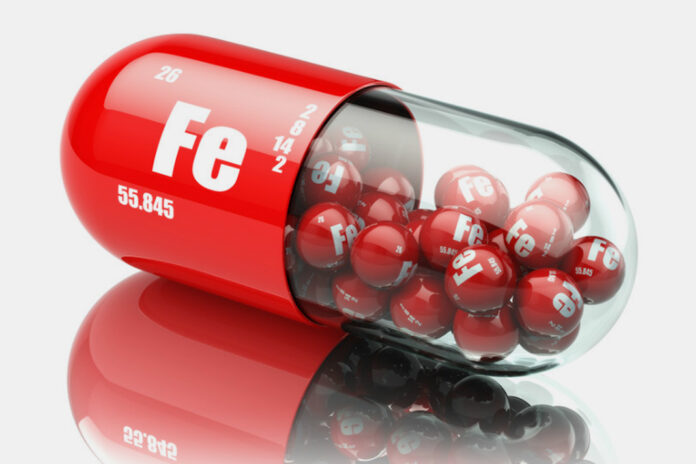Contraindications can be based on a variety of factors, including your medical history, other medications including Natural Health Supplements you are taking, existing health conditions, and potential interactions between the drug and other substances. As well, a drug may be contraindicated for someone with a history of a certain condition, such as liver disease, because it could make their condition worse. A drug may also be contraindicated for someone who is taking a Natural Health Supplement that could interact with it in a dangerous way. It is important to always consult with a healthcare provider before taking any new medication to ensure it is safe and appropriate for you.
For example:
Iron supplementation is not recommended for brain health, as it can increase the risk of stroke, heart attack, and other cardiovascular conditions. However, iron deficiency, which can be caused by inadequate dietary intake or heavy menstrual bleeding, has been linked to poor cognitive performance and can result in impaired learning and memory. Therefore, if you are at risk of iron deficiency, it may be beneficial to discuss supplementation with your healthcare provider.
Counter indications:
1. Probiotics: People with weakened immune systems, or who are on immunosuppressant medications, should not take probiotics without consulting a doctor.
2. Fiber Supplements: People with gastrointestinal conditions, such as diverticulitis, should not take fibre supplements without consulting a doctor.
3. Digestive Enzymes: People with acute pancreatitis should not take digestive enzymes without consulting a doctor.
4. Prebiotics: People with weakened immune systems, or who are on immunosuppressant medications, should not take prebiotics without consulting a doctor.
5. Glutamine: People with liver or kidney disease should not take glutamine without consulting a doctor.
6. Omega-3 Fatty Acids: People taking blood thinning medications, such as warfarin, should not take omega-3 fatty acids without consulting a doctor.
7. Betaine HCl: People with gastric ulcers should not take betaine HCl without consulting a doctor.
8. Aloe Vera: People with kidney disease, or who are taking diuretic medications, should not take aloe vera without consulting a doctor.
9. Apple Cider Vinegar: People with diabetes, gastroparesis or low potassium levels should not take apple cider vinegar without consulting a doctor.
10. Ginger Root: People with gallbladder disease should not take ginger root without consulting a doctor.
11. St. John’s Wort: People with depression, or those taking selective serotonin reuptake inhibitors (SSRIs), should not take St. John’s wort without consulting a doctor.
12. Passionflower: People with depression, or those taking benzodiazepines, should not take passionflower without consulting a doctor.
13. Lavender: People with hormone-sensitive conditions, such as endometriosis, should not take lavender without consulting a doctor.
14. Magnesium: People with kidney disease should not take magnesium without consulting a doctor.
15. Valerian Root: People with depression, or those taking benzodiazepines, should not take valerian root without consulting a doctor.
16. Zinc: People with weakened immune systems, or who are on immunosuppressant medications, should not take zinc without consulting a doctor.
17. Peppermint Oil: People with gastroesophageal reflux disease (GERD) should not take peppermint oil without consulting a doctor.
18. Vitamin D: People with kidney disease should not take vitamin D without consulting a doctor.
19. Bacopa Monnieri: People with bleeding disorders, or those taking anticoagulants, should not take bacopa monnieri without consulting a doctor.
20. Rhodiola Rosea: People with heart arrhythmias, or those taking heart medications, should not take Rhodiola rosea without consulting a doctor.
21. Ashwagandha: People with thyroid disorders, or those taking thyroid medications, should not take ashwagandha without consulting a doctor.
22. Pycnogenol: People with bleeding disorders, or those taking anticoagulants, should not take pycnogenol without consulting a doctor.
23. Coenzyme Q10 (CoQ10): People with diabetes, or those taking statins, should not take coenzyme Q10 (CoQ10) without consulting a doctor.
24. Vitamin B Complex: People with kidney disease should not take vitamin B complex without consulting a doctor.
25. Acetyl-L-Carnitine: People with kidney disease should not take acetyl-L-carnitine without consulting a doctor.
26. Phosphatidylserine: People with bleeding disorders, or those taking anticoagulants, should not take phosphatidylserine without consulting a doctor.
27. Curcumin: People with gallbladder disease should not take curcumin without consulting a doctor.
28. Vitamin B12: People with kidney disease should not take vitamin B12 without consulting a doctor.
29. Magnesium: People with kidney disease should not take magnesium without consulting a doctor.









